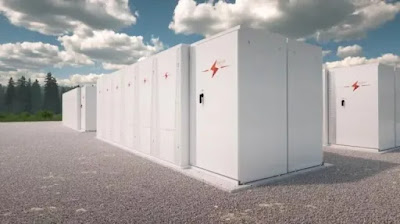Filenews 13 February 2024 - by Eleftheria Paizanou
Within March, CERA is expected to prepare the regulatory framework for storage operation in the transitional regulation of the electricity market, according to a briefing of the regulatory authority to the Parliament.
It is reminded that as of March 2022, the regulatory framework for the operation of storage systems in the competitive electricity market has been approved and published. However, due to the delay in the operation of the competitive market, CERA also promotes a regulatory framework for the transitional regulation of the market.
At the same time, CERA's note to the Parliament states that it has licensed to date eight autonomous storage systems, with a total installed capacity / storage capacity of 135MW/554MWh and 134 hybrid RES stations, combined with storage systems, with a total storage capacity of 326MW/608MWh, whose licensing by the other competent authorities of the state is expected as well as their implementation.
CERA was answering questions submitted by the members of the parliamentary Committee on Finance, in the context of a discussion of the budget of the Regulatory Authority. As is well known, there is a problem in the further installation of photovoltaics without the possibility of energy storage, as due to low consumption, a large part of green energy is rejected by the Transmission Operator.
According to CERA, electricity production from wind and photovoltaic systems is uncontrolled and depends solely on the availability of the necessary capacity and the increase in the penetration of renewable technologies in the electricity system, combined with the fact that Cyprus is not electrically interconnected, makes it necessary to install storage systems.
Ceiling
Regarding the imposition of a cap on the price of energy from photovoltaics at 11 cents per kilowatt hour, CERA explains that due to the fact that EAC, which holds a position of power in the electricity market, is a regulated organization, the purchase price of electricity from RES technologies is regulated and has been imposed at 11 cents per kilowatt hour.
CERA also intervened for the taxation of windfall profits in electricity companies, in a letter forwarded to Parliament. CERA's Office Manager Panagiotis Keliris points out that CERA's position is that any windfall profits of electricity companies that are not reinvested in energy transition activities should be taxed.
In Parliament today the increases
Today, the Trade Committee will put under the microscope EAC's request for an increase in the price of electricity. CERA reiterates that, due to EAC's position of power in the electricity market, it submits to CERA its requested permitted revenues, based on the regulatory decision on the Methodology of Electricity Tariffs. "In 2023, EAC's permitted revenues showed an increase of 13% and therefore there was an increase in basic tariffs of 25%, due to a reduced forecast for electricity sales," CERA stresses.
In her decision not to accept the 25% increase for 2023, she took into account that persistently high energy prices have a negative impact on citizens and businesses. In addition, he stresses that CERA's duty is to protect consumers against monopoly prices. EAC filed an appeal against CERA's decision with the Administrative Court.
